|
Genres, Themes, Actors, and Directors:
- Bette Davis Films
- Dan Duryea Films
- Deep South
- Family Problems
- Greed
- Herbert Marshall Films
- Marital Problems
- Play Adaptations
- Siblings
- Teresa Wright Films
- William Wyler Films
Review:
William Wyler’s adaptation of Lillian Hellman’s 1939 stage play remains a deeply troubling drama showcasing both the worst of humanity and noble attempts to push back against greed and corruption. In terms of the story itself, Bosley Crowther’s spot-on review for the NY Times is worth citing at length:
No one who saw the play need be reminded that Miss Hellman was dipping acid straight when she penned this fearful fable of second-generation carpet-baggers in a small Southern town around 1900. Henrik Ibsen and William Faulkner could not together have designed a more morbid account of inter-family treachery and revoltingly ugly greed than was contained in Miss Hellman’s purple drama of deadly intrigue in the Hubbard clan. And with a perfect knowledge of the camera’s flexibility, the author and Mr. Wyler have derived out of the play a taut and cumulative screen story which exhales the creepy odor of decay and freezes charitable blood with the deliberation of a Frigidaire.
Davis deservedly won an Oscar nomination as the middle-aged matriarch at the cold heart of the family’s treacherous scheme, and Wright makes a lovely cinematic debut as her good-hearted daughter. Also notable is Patricia Collinge in a small but memorable role as Reid’s alcoholic wife, who shares some of the family’s deepest truths while under the influence. Wyler’s direction and Gregg Toland’s cinematography effectively convey the claustrophia and heightened tensions of this “parlor drama”, which opens up occasionally into the town and other settings but primarily takes place within the cavernous family home. As DVD Savant writes about Wyler:
… shot-for-shot he’s a supremely superior director. His scenes are built around the drama instead of a strong personal style so he’s not as distinctive as Hitchcock, Ford, or Hawks. But after you’ve seen a few, especially those films he made with Gregg Toland, his style jumps out immediately.
This one is well worth a look on multiple counts.
Redeeming Qualities and Moments:
- Bette Davis as Regina
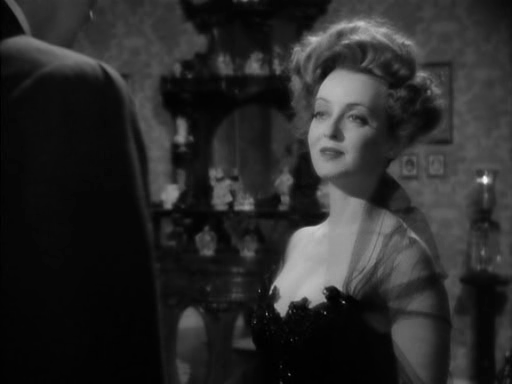
- Teresa Wright as Alexandra
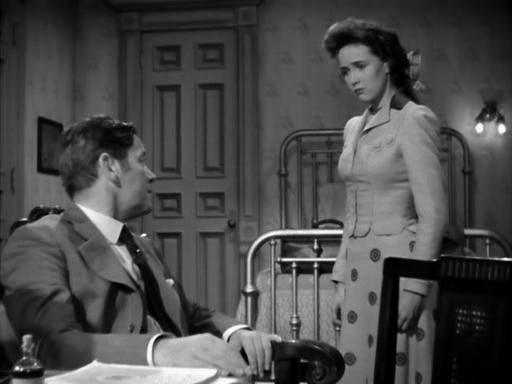
- Herbert Marshall as Horace
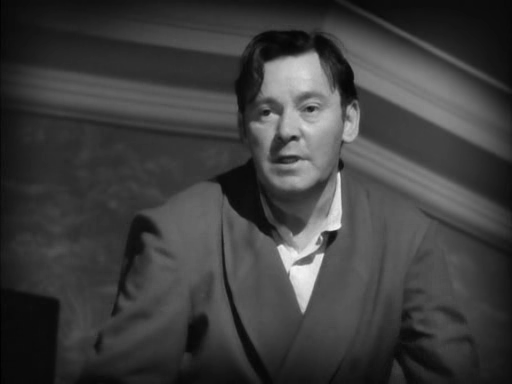
- Patricia Collinge as Birdie
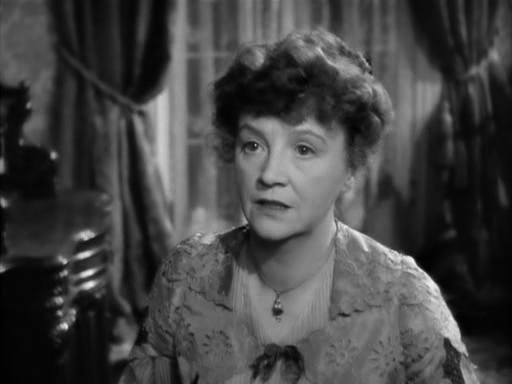
- Strong direction throughout

- Gregg Toland’s cinematography
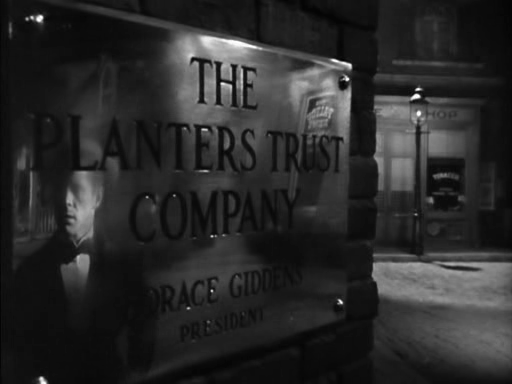
Must See?
Yes, for Davis’s performance and as a still-powerful adaptation. Listed as a film with Historical Importance and a Personal Recommendation in the back of Peary’s book.
Categories
- Noteworthy Performance(s)
Links:
|
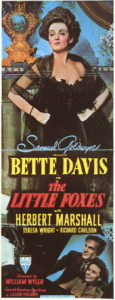






One thought on “Little Foxes, The (1941)”
Agreed, a must-see – for all of the performances (it’s esp. intriguing seeing Davis and Reid match each other as ‘sparring partners’), and for its theme.
Recently here – about the Wyler film ‘Carrie’ – I bemoaned the fact that that film reflected a terrible view of humanity, making it a hard film to recommend.
The same could almost be said about this film, except for two things:
1) On the periphery of the greed are some decent characters – who offer balance to the general awfulness of the atmosphere. (An additional source of goodness is supplied by the character of David – since Carlson’s role was not in the original play.)
2) Unlike in ‘Carrie’, here we either get a better understanding of why the odious characters do what they do (we get this especially from Regina) or there’s more complexity to the self-serving characters – so we can at least learn more from observing their behavior.
That said, it’s still not an easy or pleasant watch, overall (even if Orry-Kelly’s costuming does make Davis look like a knockout). It’s always unsettling watching evil behavior. Yet there’s so much satisfaction to be gained (in the film’s final moment) from Wright’s simple-yet-loaded question to Davis: “Why? Are you afraid, mother?” Davis’ Regina *is* afraid – no matter how many times she (noticeably) puts her hand to her hair to check that every strand is in place and that, therefore, she has ‘control’.